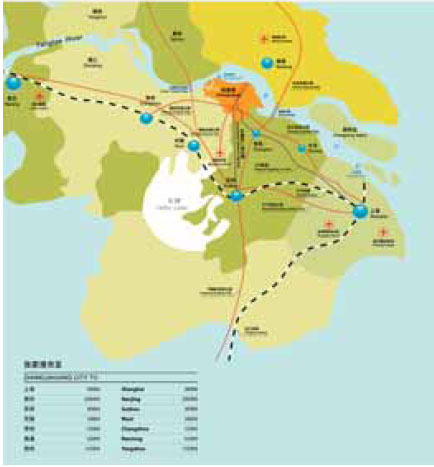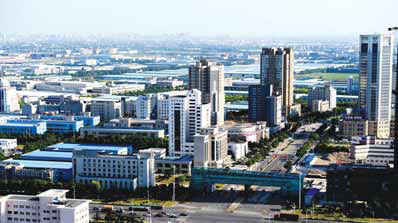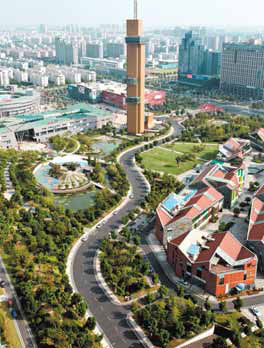Small city has big plans to draw talent
Updated: 2013-04-08 07:58
By Zhou Furong and Yang Cheng (China Daily)
|
||||||||
|
The Zhangjiagang Free Trade Zone was able to attract experts in the emerging field of magnetic sensor technology with help from local government's talent initiatives. Photos Provided to China Daily |
|
Zhangjiagang Economic and Technological Zone is now a hot spot for investment. |
For some, leaving a national-level semiconductor laboratory in Australia to work in a small city in Jiangsu province might seem like a step backward.
But when post-doctorate fellow Zhou Bing decided to move to the eastern Chinese port city of Zhangjiagang to start his own business two years ago, he never looked back.
Supported by the city government, Zhou teamed up with Junma Group, a local company, to set up Ever-power Semiconductor Co.
Zhou provided 1 million yuan ($161,290) as initial funding and held a 51 percent stake thanks to his leading technology, and the remaining investment was provided by Junma. The company's total registered capital when it was founded was 10 million yuan.
Zhou is one success story of the nationwide 1,000 Personnel program, which aims to entice top talent to return to China from overseas.
"Encouraged by the city government, Junma invested another 30 million yuan later," Zhou said.
Thanks to the state-of-the-art technology Zhou provided, his project caught the attention of State-owned Shanghai Belling Semiconductor Co, which injected another 250 million yuan to set up a new joint venture.
They expect the sales value of the venture to hit 1 billion yuan this year, with pre-tax profits of 250 million yuan.
Zhou is among the top personnel who have been selected by Zhangjiagang since 2011, and his project is one of the top contributors to the city's GDP.
Xue Songsheng, another expert in the "1,000 Personnel" program, launched his own firm- Jiangsu Multi-Dimension Co in 2010 - and it is now recognized as one of world's pioneering producers of high-effect, low- cost magnetic sensors.
The gallium nitride power device research and commercialization project, which was established by returned expert Zhu Tinggang, is also expected to help Zhangjiagang's photovoltaic sector take shape soon, according to the local government. GaN is a very hard, mechanically stable wide bandgap semiconductor material with high heat capacity and thermal conductivity.
According to Zhangjiagang Daily, the city government will continue to increase investment in high-caliber personnel to boost its local economy.
It has allocated 170 million yuan for the upcoming project in 2013, including direct subsidies for business startups and R&D facilities, preferential land rental rates, and guarantees for bank loans.
More excitingly for local governments and enterprises, 25 top-profile personnel signed agreements to launch 19 projects in late March, injecting more vigor into local advanced industries, such as lithium battery production, biopharmaceuticals, nanomaterials and smart grids.
They will work with local firms to help close the gap between them and international competitors.
Government officials vowed to help leading personnel establish new companies, and they are promising a minimum stake of 30 percent to experts in newly founded enterprises.
Since 2011, the city has attracted 12 projects involving top talent from overseas. Together, these account for a combined investment of up to 300 million yuan.
Strategy
A county-level city governed by the economic powerhouse Suzhou, Zhangjiagang is 130 kilometers from Shanghai.
With only a population of 905,000, the city generated 205 billion yuan in GDP last year.
It is no exaggeration to say that the continuous prosperity of Zhangjiagang is the result of its talented, sometimes brilliant, people.
In the mid-1990s, the city's breakneck development wowed members of the central government, and the term "Zhangjiagang Spirit" was coined in recognition of its citizens' united efforts to create outstanding economic growth.
The whole country was mobilized to follow Zhangjiagang's lead.
The success story of the city is one of an economy driven by human intelligence that makes the best use of limited resources.
Although the city's strategy has always been driven by talent, the search has become more international in recent years.
After an in-depth survey of some 300 large-scale enterprises two years ago, the government made a series of strategic plans and identified five vital sectors, including smart grid, biopharmaceuticals, new information technology, environmental monitoring and alternative-energy cars.
The plan recognized that top talent was needed to bolster these emerging industries.
The city officials are highly active in seeking out top talent through the national 1,000 Personnel project, and they have put forth 100 as candidates for local projects.
It has organized job fairs at Suzhou University, Xi'an Jiaotong University, Harbin Institute of Technology and Hunan University.
The city government has helped introduce magnetic sensor experts to the Zhangjiagang Free Trade Zone, lithium battery researchers to a local metallurgy park and manufacturing equipment elites to Nanfeng county.
To date, experts from the 1,000 Personnel program have established 31 projects and 10 workstations.
Five experts from the program have teamed with local enterprises and reaped harvests. Other newly settled elites have been selected through other channels as well. More projects are in the pipeline.
The local government has begun using the number and quality of new high-profile professionals as an index for evaluating officials' performance.
A competition to assess the development of human resources has also been held in Zhangjiagang to inspire local firms to attract the best talent.
The initiatives are expected to help Zhangjiagang outstrip other cities in China in terms of emerging sectors.


 In Photos: 7.0-magnitude quake hits Sichuan
In Photos: 7.0-magnitude quake hits Sichuan
 Li Na on Time cover, makes influential 100 list
Li Na on Time cover, makes influential 100 list
 FBI releases photos of 2 Boston bombings suspects
FBI releases photos of 2 Boston bombings suspects
 World's wackiest hairstyles
World's wackiest hairstyles
 Sandstorms strike Northwest China
Sandstorms strike Northwest China
 Never-seen photos of Madonna on display
Never-seen photos of Madonna on display
 H7N9 outbreak linked to waterfowl migration
H7N9 outbreak linked to waterfowl migration
 Dozens feared dead in Texas plant blast
Dozens feared dead in Texas plant blast
Most Viewed
Editor's Picks

|

|

|

|

|

|
Today's Top News
Live report: 7.0-magnitude quake hits Sichuan, heavy casualties feared
Boston suspect cornered on boat
Cross-talk artist helps to spread the word
'Green' awareness levels drop in Beijing
Palace Museum spruces up
First couple on Time's list of most influential
H7N9 flu transmission studied
Trading channels 'need to broaden'
US Weekly

|

|









